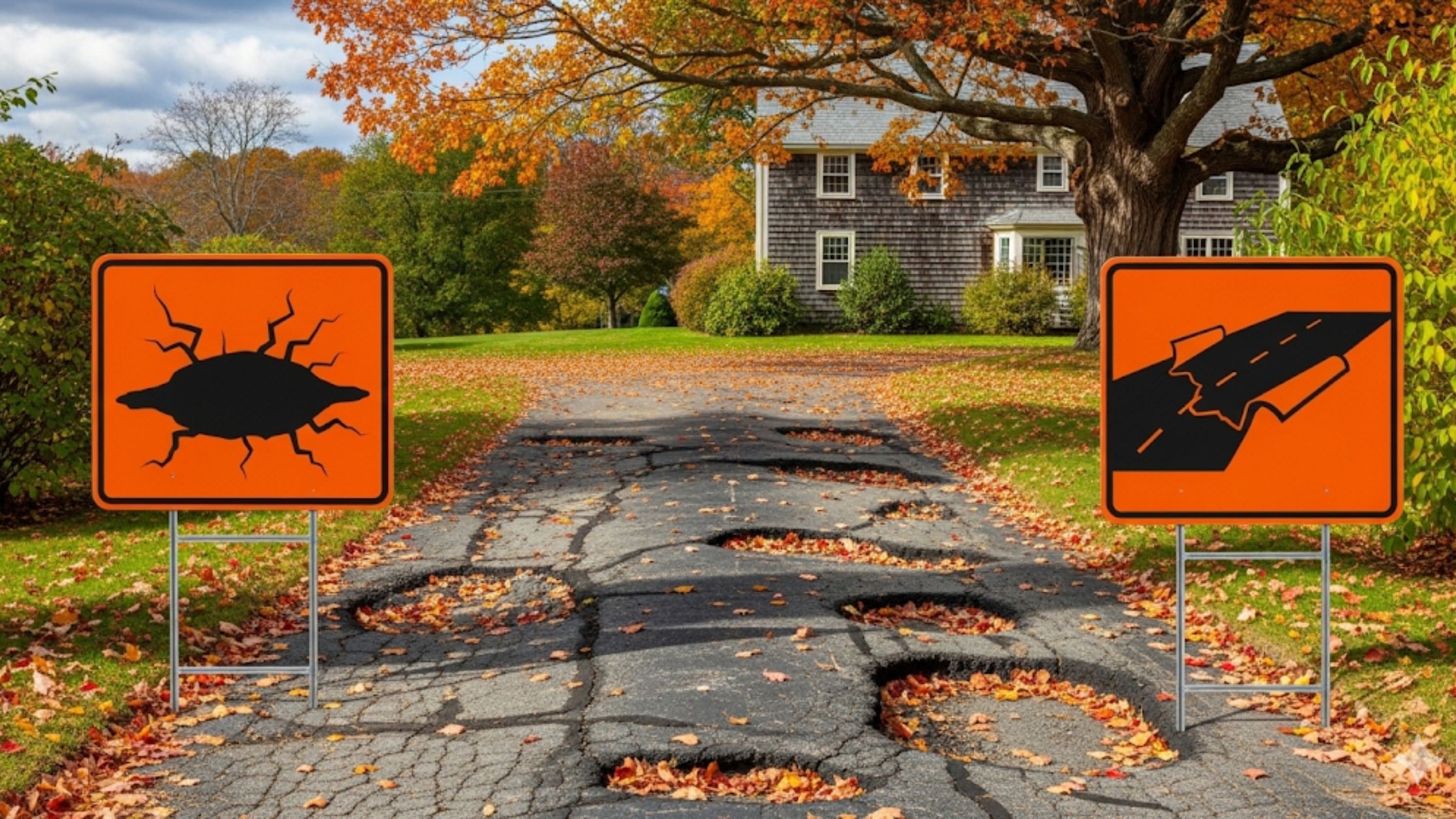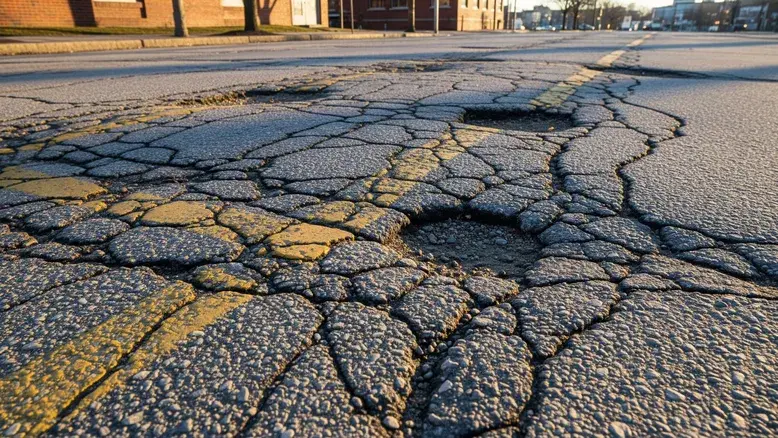Massachusetts homeowners know winter isn’t kind to driveways. Asphalt looks tough, but it’s vulnerable to water and cold. When water seeps into cracks, it freezes, expands, and forces the asphalt apart. By spring, those small cracks often turn into potholes. In short, the damage signs are already starting to appear in winter, and by the time spring arrives, it gets worse.
Many homeowners in Massachusetts in cold climates echo the same warning: “A crack in October becomes a crater by March.” What to do here to mitigate this? Most asphalt repair contractors in Massachusetts explain that early repairs are always cheaper than full replacements.
However, what are the signs that alarm the homeowners before taking steps to avoid any damage? You don't have to worry about it. We have curated a list of telltale signs that indicate your need for asphalt repairs.
Signs You Need an Asphalt Repair Contractor In Massachusetts Immediately
Addressing minor signs saves you big money later. A tiny crack you can seal today for $50 might turn into a pothole that costs hundreds to fix by spring. Wait too long, and you might need asphalt replacement, which costs thousands more than simple asphalt maintenance. Nobody wants that, right? So keep an eye out for the following signs and call the asphalt company in Massachusetts the moment you spot a single crack in the asphalt.
Sign 1: Visible Cracks in the Asphalt
Cracks are the most obvious red flag. They come in different shapes:
- Hairline cracks that look harmless but let in water.
- Alligator cracks that spread like a spider web across the surface.
- Straight or zigzag cracks that run across the driveway.
Why it matters: Massachusetts has constant freeze-thaw cycles. Temperatures swing from 40°F one day to 20°F the next. Each freeze expands the cracks wider. Leave them alone, and they become potholes.
What to do: Promptly call for asphalt repair experts in Massachusetts who offer crack sealing services. These are affordable and protect your driveway for years.
Sign 2: Potholes and Surface Depressions
If you see holes or dips in your driveway, don’t ignore them.
- Potholes form when water enters cracks and freezes, breaking pieces loose.
- Depressions are low spots where water collects after rain.
- Soft areas underfoot mean the base layer is failing.
Why it matters: Potholes aren’t just ugly; they’re dangerous. They trip people, damage tires, and in winter, they turn into hidden ice patches. Snow plows also make potholes worse by ripping at the edges.
A tiny dip became a wheel-eating pothole after two snowstorms in Massachusetts. That’s the reality here.
What to do: Let local asphalt contractors in Massachusetts patch potholes before they spread. It’s faster and cheaper than letting them grow all winter.
Sign 3: Drainage Issues and Standing Water
Water is your driveway’s enemy. After a storm, watch where the water goes.
- Does it pool on the surface for hours?
- Does it run toward your house instead of away from it?
- Do you see puddles along the edges?
Why it matters: In winter, those puddles freeze into ice sheets. That’s dangerous for walking and driving. Worse, poor drainage near your house can seep into your foundation, causing costly damage.
Massachusetts gets heavy snowfall. When all that snow melts in spring, bad drainage means water everywhere.
What to do: An asphalt company in Massachusetts can fix drainage problems with proper grading or resurfacing. It protects both your driveway and your home.
Sign 4: Fading and Surface Wear
The new asphalt looks black and smooth. Over time, it fades to gray. But when it turns light gray and chalky, that’s a warning sign.
Other signs of surface wear include:
- Loose gravel or stones on the surface.
- A rough, uneven feel when you walk on it.
- Pieces of asphalt are breaking away.
Why it matters: Faded asphalt is weaker asphalt. Road salt, snow, and cold hit it harder. Without protection, it breaks down fast, and soon you’re looking at full replacement.
What to do: Sealcoating adds a protective layer, almost like sunscreen for your driveway. It blocks water, salt, and UV damage. Many homeowners in Massachusetts say sealcoating every 2–3 years is the best way to make a driveway last in New England.
Sign 5: Edge Cracking and Crumbling
Driveway edges take the most abuse. They’re exposed to frost, plows, and heavy vehicles. Signs to look for include:
- Cracks running along the edge.
- Chunks of asphalt are breaking off into the grass.
- Weak transitions where asphalt meets sidewalks or walkways.
Why it matters: Once the edges crumble, the damage spreads across the driveway. Snow plows scrape the sides and pull away more asphalt. By spring, what started at the edges creeps into the middle.
What to do: Call Asphalt repair contractors in Massachusetts; they can rebuild weak edges before winter makes them worse.
When to Call Local Asphalt Contractors in Massachusetts
If you notice any signs, such as cracks, potholes, drainage problems, fading, or crumbling edges, it’s time to call for help. Professional contractors can:
- Seal cracks before they spread.
- Patch potholes while they’re small.
- Resurface driveways with drainage issues.
- Apply sealcoating to protect against salt and snow.
- Rebuild weak edges before they fail.
Final Thoughts: Act Now, Save Later
If you live in Worcester, Boston, Springfield, or anywhere in Massachusetts, look for signs of damaged asphalt, and call trusted asphalt repair contractors in Massachusetts to get your driveway ready for the season ahead. These problems will only get worse once snow and ice arrive. Fixing them now costs far less than waiting until spring.
If you are looking for a company to fix your driveway or parking lot, you can always rely on The Sealcoating Guys in Massachusetts. Our licensed crews deliver lasting sealcoating, crack filling, line striping, and snow plowing done in just one day. Locally owned and 5-star rated, we make asphalt care simple, affordable, and dependable.
Call 413-252-9170 today to speak directly with a crew lead or request a free quote to make your pavement completely protected year-round.
FAQs
1. How often should I sealcoat my driveway in Massachusetts?
Most driveways here need sealcoating every 2–3 years. Harsh winters, salt, and plowing wear asphalt faster, so regular sealcoating protects it and keeps it looking fresh.
2. Can small cracks in my driveway wait until spring?
No. In Massachusetts, water freezes in cracks and makes them bigger over winter. Fixing them in the fall is much cheaper than repairing potholes in the spring.
3. How long does driveway sealcoating take to dry?
Sealcoating usually dries in 24–48 hours, depending on the weather. In Massachusetts’ cooler fall months, it may take closer to 48 hours before driving on it.
4. Do I need to replace my driveway if it has potholes?
Not always. If the base is still solid, local asphalt contractors in Massachusetts can patch potholes. Replacement is only needed when the surface has widespread damage.
5. What’s the best time of year for asphalt repair in Massachusetts?
Spring through early fall is best. By late fall, cold nights and early frosts make repairs harder. Most homeowners schedule asphalt repairs before winter to prevent damage.





.webp)

.svg)



